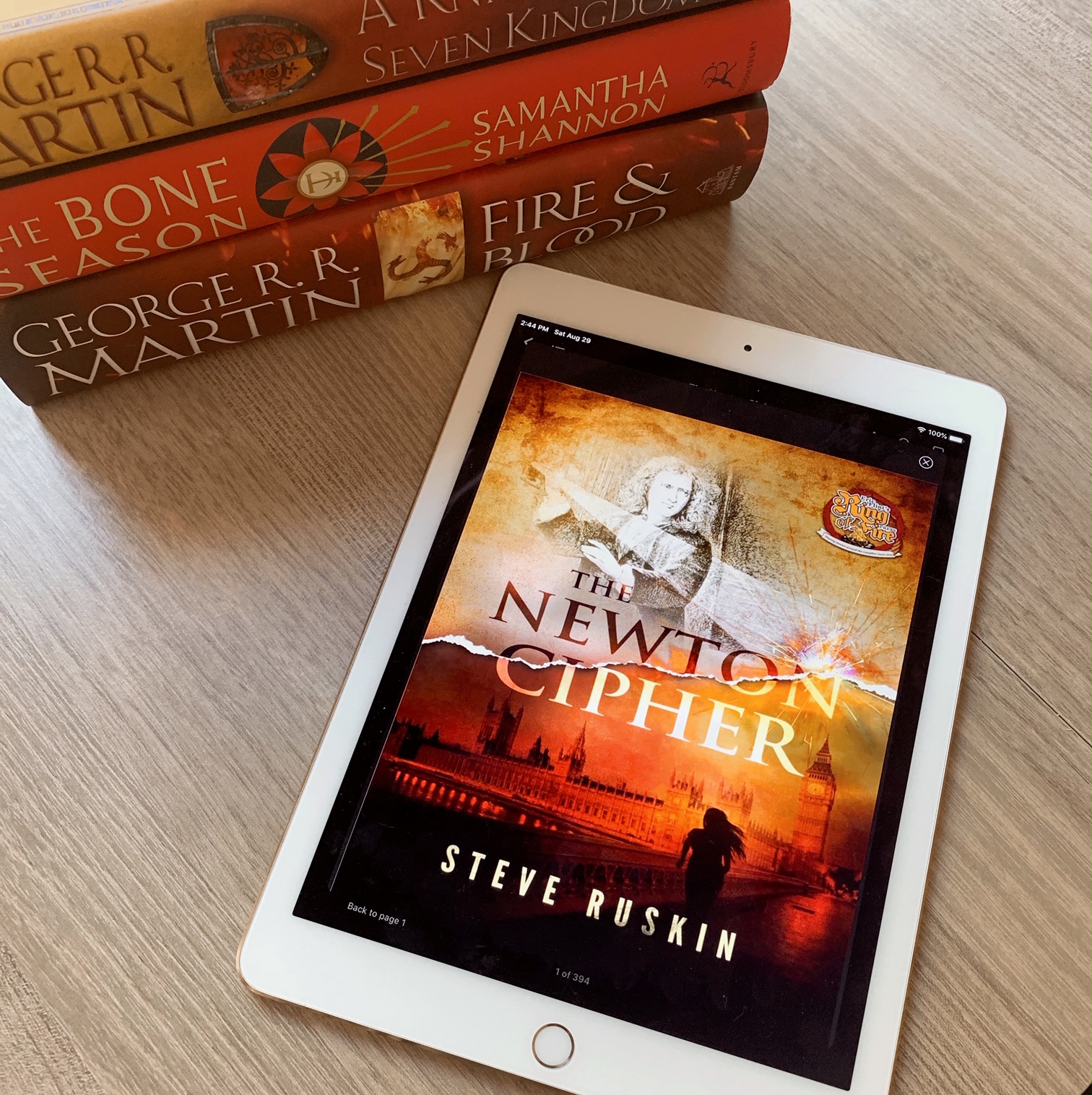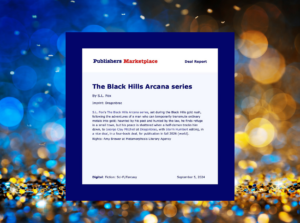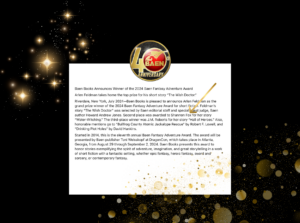The Newton Cipher by Steve Ruskin
Historian Trina Piper is summoned to the British Library to authenticate a coded manuscript believed to be authored by none other than Isaac Newton himself. At the same time, London finds itself in the grip of a series of ghastly murders.
When a malicious Russian scholar appears and demands the manuscript, Trina becomes the target of his wrath. She soon realizes that Newton’s papers and the terrible murders are connected, and both hint at something far more ominous: a secretive Order dedicated to reviving alchemy for sinister purposes.
Caught between ancient magic and a shadowy cabal, Trina must find a way to save not only herself, but all of London. With the help of Ulrik Stander, a handsome and resourceful agent from Interpol’s Art and Artifacts Division, she rushes from Westminster’s fog-filled alleyways to the hallowed halls of Cambridge University in a race to prevent a forgotten seventeenth-century plague from being unleashed on modern London.
As Big Ben ticks down, she discovers that Isaac Newton carried a secret so dark he buried it beneath layers of stone and forbidden magic. But now the secret is out and people are dying.
Will Trina have enough time to solve the mystery before disaster strikes?

I met Steve a few years ago at Superstars Writing Seminars, but really got to know him more in the last year or so when we both had stories in the Cursed Collectibles Anthology. When Steve told me about his new book coming out and I read the description, I knew this was something I wanted to read because it was right up my alley.
But when I sat down to start the book, I didn’t predict how much I would love it straight off the bat. It reminded me a lot of when I first sat down to read The DaVinci Code, which was my first introduction to adult thrillers in general and more specifically to thrillers with a historical angle to them. I fell instantly love with this subgenre and all these years later, The Newton Cipher delivers the same captivating reading experience.
I read almost the first half of the book in one evening and then finished up the rest the following weekend. The book gets quickly underway, delivering a smart, fresh story that, unlike some others I can think of in the genre, is as well-written as it is entertaining. I enjoyed the historical angle Ruskin covers in this story and think it is a fantastic introduction to a new series. I’m eagerly awaiting the next installment. Actually I need about ten more of these books, stat!
I particularly loved the meticulous research that went into the story and those that have previously visited London and Cambridge will enjoy journeying back to England in The Newton Cipher. Since it is 2020, I’ll note that the book does contain mention of a plague which is about as eerie and unsettling as you’d imagine it would be to read about while experiencing a global pandemic. Of course, I have to give credit where credit is due and Ruskin gets all those details exactly right as well. I just wish we weren’t actually having to live through it to fact-check that part.
If you’re looking for a fast-paced and fun new read this fall, definitely pick up a copy of The Newton Cipher on Amazon!
Today I’m also excited to bring you more than a book review – Steve agreed to do an interview with me AND give away a signed paperback copy. Make sure you read all the way to the end to find out how you can win your own copy of the book!
| Shannon Fox (SF): You’re a historian of science. What exactly is that, how did you become one, and how does it inform your writing? Steve Ruskin (SR): I have a PhD in History and Philosophy of Science, which is a sub-field of history in general. As an undergrad I studied various sciences and engineering, and also history. I think I loved history most of all, but still had a heart for science. Around my junior year, I learned that there were universities with entire departments devoted to the history of science! So I applied to a few, got in (I chose Notre Dame), and that was that. As to myself, for a long time I wrote a lot of non-fiction about the history of science, and, when I started writing fiction, that history stuff invariably spilled over into my fiction writing. My first professional short story sale was inspired by a book of scientific drawings I had in my personal library. And recently, of course, I wrote this new novel called The Newton Cipher… SF: What inspired The Newton Cipher? SR: This is tough, as I don’t exactly remember. The real Isaac Newton was very interested in alchemy, and a few years ago I had a germ of an idea about his alchemical work being more than just an interest, but a full-on scandal, a secret that he tried very hard to bury. From there, it made sense to me that the story should become a thriller, the kind where a modern person stumbles upon that forgotten secret, and, well, BAD THINGS start to happen and suddenly the world is in danger unless the secret is solved. So, I ran with it. Plus, I used to live in Cambridge, England, and spent a lot of time in London, so I already had my setting all picked out! SF: Were you a Newton scholar before you write this book? SR: Not really, at least not in the sense of having written anything about Isaac Newton as a scholar. I had however studied him as part of my PhD coursework, reading his work (like his Opticks, and some of his other stuff). He is one of the truly pivotal figures in the history of science, so given my studies in that field it was inevitable I should know something about him. SF: Do you have a connection to South Bend, Indiana? SR: My PhD is from the University of Notre Dame, which is in South Bend. So I lived there for about five years. Being from Colorado it was far too flat and I don’t miss it now, but it’s a beautiful campus, especially in the Fall. SF: What was the most challenging part of writing this book? SR: Like any book, just cranking through the actual writing is the hard part. I more or less knew how it was going to go, but there are always surprises in the plot even you the author can’t predict. I do admit I had to spend a good deal of time working out the various codes and ciphers that my fictional Isaac Newton left behind, in order to make them as believable as possible. So I did spend a lot of time fussing with that. SF: What period of history is your favorite? SR: Just one? I’ll give you three: in the ancient world, the Golden Age of Athens (under Pericles) and the Pax Romana of Rome (under Marcus Aurelius) were both pretty awesome. And I’m quite fond of Victorian England as well. Those would have all been fun times to live. Or to visit, if you had a time machine… As to the time when Isaac Newton was alive? There was a little too much bubonic plague for my liking in the mid-17th century. And war. And fire. But it makes for a great story setting. 🙂 SF: What’s one stupid cool fact of science history you bet most people don’t know? SR: “Stupid cool”, huh? Hmm…how about this? Everyone knows Charles Darwin was hesitant to publish on his theory of natural selection, due to concerns about both its implications for religion and contemporary scientific theory. So, he sat on it for roughly two decades. In the meantime, he was absolutely and utterly obsessed with barnacles. You know, the things that attach themselves to the bottoms of ships? But from Darwin’s perspective, barnacles (or Cirripedia), provided crucial insights into his theory. He studied both living and fossilized barnacles and used them as a model for his understanding of how species developed over time. Crazy, huh? In fact, Darwin was so obsessed with barnacles–I mean, he worked on them for hours a day, for many years–that his children just assumed dissecting barnacles was what everyone’s father did. One day, when his son Leonard went to a friend’s house to play, Leonard reportedly walked into the friend’s house, looked around with a puzzled expression, and then said “Where does your father do his barnacles?” SF: Who is your favorite scientist? SR: The word ‘scientist’ wasn’t coined until 1833. So it would be anachronistic to call people scientists before then. Alas, this fact excludes people like Isaac Newton, and Leonardo Da Vinci, and even women like Margaret Cavendish from being called proper scientists. Those folks would have thought of themselves as ‘natural philosophers.’ “Fine,” you say. “But aren’t you just being pedantic?” Yeah, probably. But I just want to clarify, that when I say my all-time favorite scientist was Galileo, that he wasn’t technically a scientist. He was a natural philosopher. And also a badass. SF: What authors have inspired you on your writing journey? SR: There are honestly too many to mention. So many contemporary writers, both friends and mentors, inspire me all the time, and I am fortunate to be in a community of writers (which includes you, Ms. Fox), who keep me inspired by their hard work. Among the authors whom I love to read, however, and who inspire me by their own work, are Neal Stephenson, Michael Flynn, and Kristine Kathryn Rusch. And if I don’t stop typing now, I could probably extend this list to 100 or more. SF: What was your writing (and rewriting) process like? SR: I tend not to rewrite too much, but I do spend a lot of time on my first draft so that the second draft is mostly refining. SF: Do you use a computer or write by hand before transcribing? SR: Computer. I’d love to be one of those who write their first draft by hand, but my handwriting sucks. I’d end up looking at the manuscript and thinking, ‘What the hell is this gibberish?” SF: Do you listen to music when you write? If so, what do you like to listen to? SR: Yes, I often do, but rarely music with words. I try to find soundtracks and “mood” music on Amazon Music. I also like the really cool 10-minute clips on TabletopAudio.com. They are designed for gamers, but they can really help writers set the mood for different scenes. SF: What did you edit out of this book? SR: Many, many, many mistakes. And bad ideas. And things I thought were funny at the time but clearly were not. Like, not even close. SF: What’s next for Trina and crew? SR: I’ve been thrilled at the response to The Newton Cipher, and readers tell me they want more. So, there are some fun things ahead for Trina and crew. Let me just say that I love Europe, have lived and traveled there extensively, and so I think Trina will find herself doing the same things as she realizes that the forces of evil, who still want to possess ancient alchemical secrets, are none too happy that Trina stopped their little scheme in London, and are now looking to execute their nefarious plans elsewhere… SF: Where can people find out more about you and your upcoming projects? SR: On the web I’m at www.steveruskin.com, where people can sign up for my newsletter (and get a free book!). I’m also on Facebook at facebook.com/SteveRuskinAuthor. Stop by! How to Win a Free Copy of The Newton Cipher Thank you to Steve for agreeing to give you a chance to win a free signed copy of his new book! Entering is easy – all you have to do is leave a comment below with the name of your favorite scientist (or favorite historical fact!) to be entered to win! This contest is also open on Instagram and Facebook so please visit my pages to see the corresponding post with more instructions on how to get extra chances to win! The contest is open from now until September 6th, 2020! |



